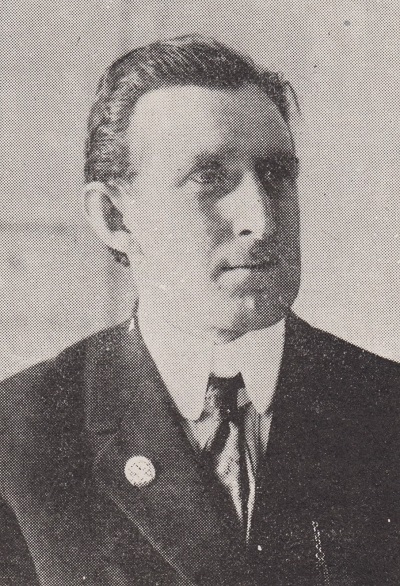
Edward Winter

Frank James Marshall
On page 138 of My Fifty Years of Chess (New York, 1942) Frank J. Marshall wrote the following introductory note to his game against Levitzky (or Levitsky) at Breslau, 1912:
‘Perhaps you have heard about this game, which so excited the spectators that they “showered me with gold pieces!”. I have often been asked whether this really happened. The answer is – yes, that is what happened, literally!’
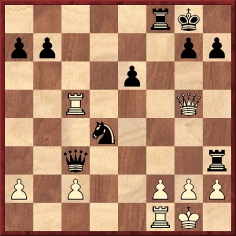
Black played 23...Qg3, and White resigned.
There are, though, varying accounts of this incident, and several Chess Notes items have discussed it (see, in particular, pages 303-305 of Kings, Commoners and Knaves). For example, C.N. 670 quoted from a letter dated 13 October 1975 in which Irving Chernev informed us:
‘Let’s put the quietus on this, once and for all! Frank J. Marshall himself (in person, not a moving-picture) told me himself that it was true. The spectators, he said, threw gold pieces on his board at the conclusion of his brilliant win over Levitzky. While Marshall’s memory was sometimes faulty (he remembered very few of his great games) this was an incident one could hardly forget.’
In C.N. 2148 Owen Hindle (Cromer, England) quoted from page 62 of Marshall’s Chess “Swindles” (New York, 1914), which gave the Levitzky v Marshall game with notes by Hermann Helms taken from the Brooklyn Daily Eagle. At the end Helms wrote:
‘After the game a number of enthusiastic spectators presented Mr Marshall with a handful of gold pieces, saying the game had given them great pleasure.’
That sounds decidedly less colourful than ‘showering’. On the other hand, Al Horowitz’s All About Chess (New York, 1971) gave the game twice (on pages 63 and 150), each time with a denial, based on a statement by Marshall’s widow, that any gold had been given (‘... Caroline Marshall, who ought to know, disclaims knowledge of even a shower of pennies’).
Discussing the matter on pages 98-99 of his book America’s Chess Heritage (New York, 1978) Walter Korn wrote:
‘Eyewitness reports, as circulated in Europe in the 1920s, come close to corroborating Marshall’s story. Two of the Czech participants at Breslau, Oldrich Duras, who had shared 1st prize with A. Rubinstein, and K. Treybal, both senior master members of the Dobrusky Chess Club in Prague, often took pleasure in recounting this and other episodes to the junior members, including myself. As corroborated by their compatriots Dobiáš, Hromádka, Pokorný, Thelen, and other Czechs who had also been to Breslau, what really happened was the paying of a bet. As the story was told, the Leningrad master Levitsky was accompanied by another Russian, P.P. Saburov, a well-to-do patron of the game. Another visitor was Alexander Alekhine, a dapper, prosperous aristocrat who was on his way from Stockholm (where he had won 1st prize) to a tournament in Vilna. Saburov, Alekhine, and a few other Russian guests made it their duty to place a wager on Levitsky’s win over the “played-out American”. However, Marshall upset their patriotic predictions and the bettors tossed over their pledges. Rubles, marks, Austrian crowns, and similar coinage of the period were minted partly or fully in gold. As related by Zidlicky, even the silver Maria Theresa thalers came in the “shower”, something not mentioned in the respectable accounts of the tournament book.’
On page 204 of Frank J. Marshall, United States Chess Champion (Jefferson, 1994) A. Soltis asserted that this was ‘the best explanation of what actually happened’. He also reported that Marshall’s original handwritten notes to the game merely commented, ‘A purse was presented to me after this game’. We wonder whether a reader can discover more details in the local press. The tournament book states that the game was played on 20 July 1912.
On page 107 of his book Chess Lists (Jefferson, 2002) Soltis wrote similarly about Marshall’s notes.
In the New Scientist, 4 September 1993, page 27, Raymond Keene claimed that Marshall ‘forced checkmate ... by hurling his queen into a forest of opposing pawns ...’
There was no forced mate.
On page 27 of the February 1935 Chess Review Arnold Denker wrote regarding the conclusion of the Marshall game:
‘This is by far the finest and most artistic queen sacrifice that I have ever seen.’
(6984)
Olimpiu G. Urcan (Singapore) writes:
‘As Owen Hindle observed in C.N. 2148, pages 61-62 of Marshall’s Chess “Swindles” stated that the book’s notes to the Levitzky v Marshall game were reprinted from the Brooklyn Daily Eagle (without any date being given). Marshall’s readers were left to assume that the key words at the end (“After the game a number of enthusiastic spectators presented Mr Marshall with a handful of gold pieces, saying the game had given them great pleasure”) had been written by Hermann Helms, the chess editor of the Eagle.
Pages 61 and 62 of Marshall’s Chess “Swindles” (New York, 1914)
In fact, the game – with the same annotations as in the Marshall book – had appeared on page 3 of the 8 August 1912 issue of the Brooklyn Daily Eagle, with the notable exception that Helms made no mention of gold pieces:
Thus, the comment about gold on page 62 of Marshall’s Chess “Swindles” seems to be an addition by Marshall himself.
The game was also published in the New York Sun, 18 August 1912, page 8, with annotations but no gold coins story. The score appeared too in the New York Evening Post of 21 August 1912 with Emanuel Lasker’s annotations, in a report from Berlin dated 9 August. Lasker made no mention of gold.
Page 8 of the 25 August 1912 issue of the New York Sun had the following about Levitzky:
“The Liverpool veteran Amos Burn in speaking about the Breslau international tournament gives the following information about the Russian player Levitzky:
‘One of the most interesting players of the lesser-known masters at the tournament is Levitzky, who lives on the borders of Siberia. Far from civilization, he has scarcely any opportunities for practice, or he would take a very high place among the world’s chess masters. He is undoubtedly a player of great natural talent. He has played a few games with Alekhine,who competed at Carlsbad last year, and who recently won the tournament at Stockholm. Alekhine had a majority of one in his games with Levitzky, but, of course, has much better opportunity for practice. Levitzky is 35 [sic] years old, tall, with yellow hair and beard. Knowing only a few words of German, he talks very little at Breslau, but in any case he is a silent man and of a particularly retiring disposition.’”
When the Levitzky v Marshall game was published on page 16 of the 25 May 1942 issue of the New York Post (H.R. Bigelow’s column) it was prefaced as follows:
“Here is the Levitzky-Marshall game which so pleased the spectators in the 1912 International Tourney at Breslau that they made a collection of gold (yes, we said ‘gold’) pieces for our Frank right after its conclusion.”
Finally, with regard to Al Horowitz’s statements in All About Chess that Caroline Marshall denied knowledge of the existence of any “gold coin shower”, the photograph and caption on page 68 of the March 1959 Chess Review may be noted:’
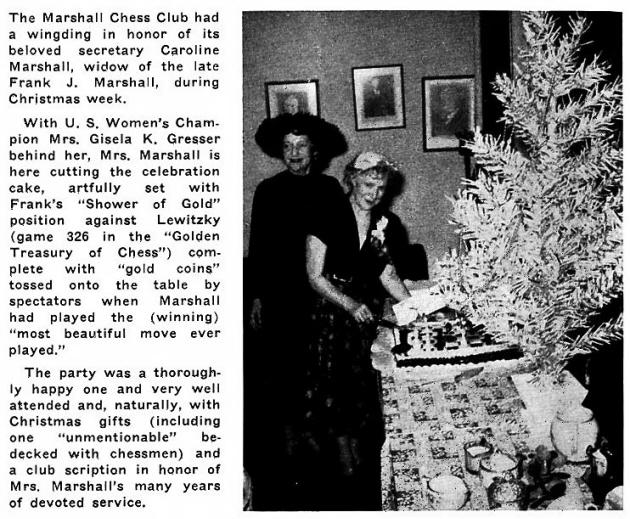
(7101)
The mystery of the Marshall ‘gold coins’ game is still proving impossible to unravel, but, more generally, below is a novel suggestion from page 79 of Play Chess by William Hartston and Jeremy James (London, 1980):
‘In the old Viennese coffee-houses where chess was played many years ago, the spectators used to admire brilliant sacrifices so much that they would shower the board with gold coins for the winner.’
(8212)
Below is the first paragraph of an article (‘Shower of Gold’) by C.J.S. Purdy on pages 110-111 of Chess World, July-August 1967:
‘Most players know about the game Levitzky-Marshall, Breslau, 1912, when a move by Marshall inspired the German onlookers to shower the board with gold pieces. We disbelieved this story until we asked somebody to ask Marshall personally if it were true. Marshall said yes.’
(9770)
The game is on page 155 of Chess Review, May 1959 with this strangely-worded opening sentence by Jack Straley Battell:
‘There are in the literature of chess a comparatively very few games which rank as past masterpieces by the virtue of one exceptionally great move.’

Black played 23...Qg3, and White resigned.
When the game was published on page 16 of the Manchester Guardian, 30 July 1912, Gunsberg wrote of 23...Qg3:
‘One of the strangest moves that any player can make, though again fairly obvious after seeing it.’
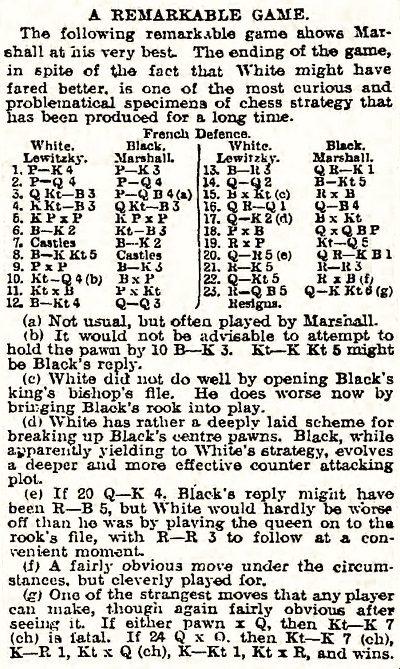
An extract from a letter to us dated 23 May 1990 from Warren Goldman:
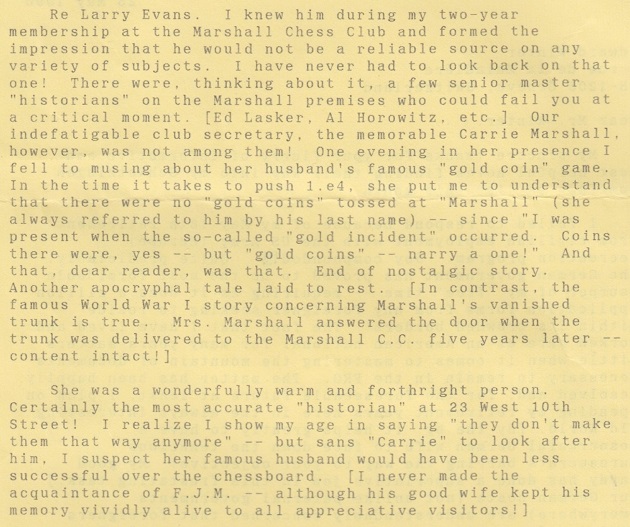
(11844)
Addition on 27 June 2021:
The ‘gold coins’ topic was first raised in C.N. in the May-June 1982 issue of the magazine, and below is the full text (C.N. 103):
Paul Timson (Blackburne, England) would like to know whether spectators really showered the board with gold pieces after Black’s 23rd move in the game Levitzky v Marshall, Breslau, 1912. He points out that, amongst others, Golombek has cast doubt on the story (in A History of Chess) even though Marshall himself states in his autobiography that the incident really did occur.
We do not know if the citizens of Breslau in 1912 were likely to have been carrying gold coins in their pockets – perhaps a coin expert can tell us. But in any case, the story is almost definitely dubious in the manner that it is told. What exactly does showering coins mean, anyway?
The text of C.N. 585:
A book with a large number of factual errors is 100 Classics of the Chessboard by A.S.M. Dickins and H. Ebert (Oxford, 1983). Pages 28-29 contain the most curious blunder we have seen in a recent book. The co-authors wish to give the finish of Marshall’s ‘Golden Game’ (23...Qg3!!), played against Levitzky in the Breslau tournament of 1912. However, they claim this was actually the game Janowsky-Marshall, Biarritz, 1912, presumably confusing another spectacular queen move by Marshall in the third match-game against Janowsky, 12...Qxf3. The sad result of this chaos is a pen-portrait of Janowsky, whose name should not even be mentioned, to say nothing of calling Marshall ‘F.G.’ instead of ‘F.J.’, plus the fact that it is incorrectly claimed the game went on to mate whereas in fact Janowsky, sorry – Levitzky ..., resigned at once after seeing the queen move. Astonishing.
The above appeared on page 145 of Chess Explorations, and in an endnote on page 265 we wrote:
A quote may be added from page 151 of Chess Step by Step by F.J. Marshall and J.C.H. Macbeth (New York, 1924):‘... the spectators were so delighted with this wonderful dénouement that they enthusiastically made up a gold collection and presented a handsome purse to the victor.’
That sounds decidedly more genteel than showering.
Two other relevant links: Wade v Bennett and The Fox Enigma.
As a contrast to Levitzky v Marshall, see the first game in Black Plays ...Qh2 mate.
Another example of such a queen sacrifice (with, however, a pin on the black f -pawn):
Frank James Marshall (blindfold) – Allies
Kingston, N.Y., 15-16 November 1914
Centre Gambit
1 e4 e5 2 d4 d6 3 Nf3 Ne7 4 dxe5 Bg4 5 Bc4 Nbc6 6 Nc3 Nxe5 7 Nxe5 dxe5 8 Qxg4 Ng6 9 Be3 Bd6 10 O-O-O O-O
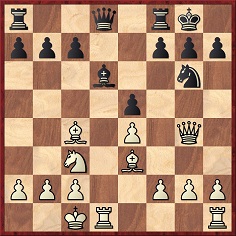
11 Qxg6 hxg6 12 h4 a6 13 h5 gxh5 14 Rxh5 g6 15 Rh6 Kg7 16 Rdh1 Kf6 17 Nd5+ Ke6 18 Nb6+ Ke7 19 Bg5+ f6 20 Rh7+ Ke8 21 Bh6 cxb6 22 Bxf8 Bxf8 23 Bf7+ Kd7 24 Rd1+ Bd6 25 Bd5+ Ke8 26 Bxb7 Rb8 27 Rh8+ Kd7 28 Rxd8+ Rxd8 29 Bxa6 Kc7 30 Bb5 Rh8 31 f3 Rh2 32 Bf1 f5 33 exf5 gxf5 34 Kd2 Rh4 35 c3 Rh8 36 b4 Rd8 37 Kc2 f4 38 a4 Ra8 39 Bb5 Rg8 40 Rd2 Rc8 41 Kd3 Kb7 42 Ke4 Rxc3 43 Rxd6 Black resigns.
The allies were: Sam Bernstein, John D. Kline, Emanuel Metzger, F.H. Sanford, Charles Reynolds and M. Schlessinger.
Source: American Chess Bulletin, December 1914, page 258, which quotes the Kingston Daily Freeman:
‘This was one of the most thrilling games of its kind ever played, because Mr Marshall relaxed his attention for a moment and on his eleventh move made the error of giving up his queen for a knight. This error would have meant defeat for any ordinary player, even when able to see the board, and the fact that Mr Marshall nevertheless won is amazing.’
(2022)
Michael McDowell (Westcliff-on-Sea, England) points out that Marshall used a similar theme in a problem which was listed as a non-prizewinner on an unnumbered page of volume one, issue seven of The Good Companion Chess Problem Club (March 1914 tourney):

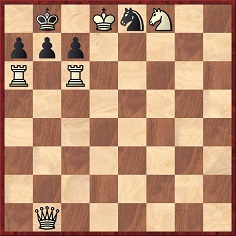
Mate in two
(11962)
Wanted: more detailed local (i.e. Breslau/Wrocław) information about Marshall’s ‘Gold Coins’ game, and also about the loser.
Other games where a queen moves to KKt6 (i.e. g6 or g3) are discussed in The Fox Enigma.
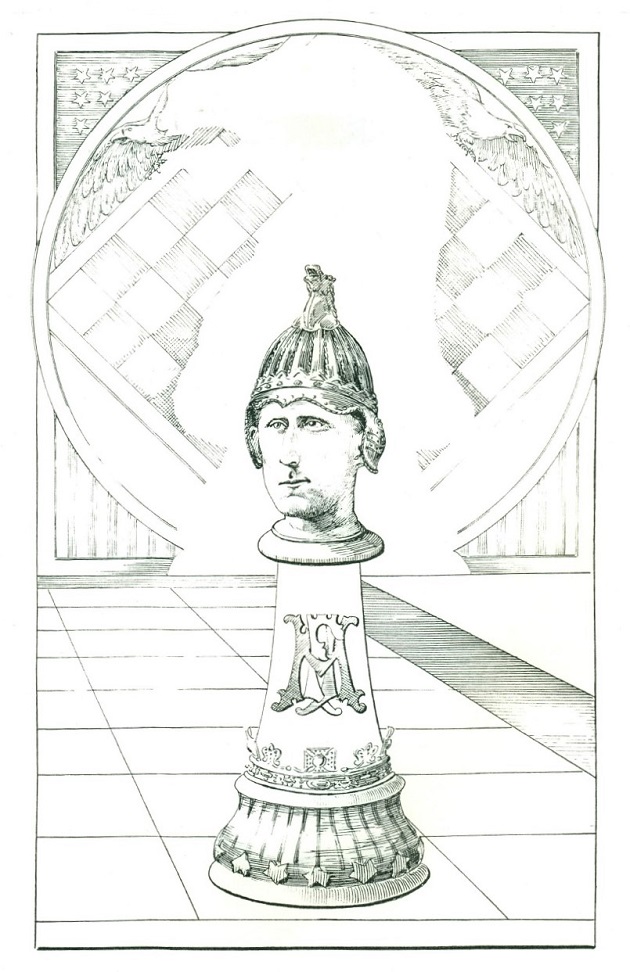
Frank James Marshall by Frederick Orrett (see C.N. 9722)
Regarding the alleged gold coins episode, the English-language Wikipedia page on the game currently cites, of all things, a 2006 book published by Cardoza:
‘Eric Schiller wrote, “others say they were just paying off their wagers”.’
C.N. 12063 referred to the existence of a Wikipedia project group created to ‘improve information on chess-related articles’. The project group states:
‘Print sources are generally considered reliable, but certain authors such as Eric Schiller and Raymond Keene have a reputation for unreliability.’
(12129)
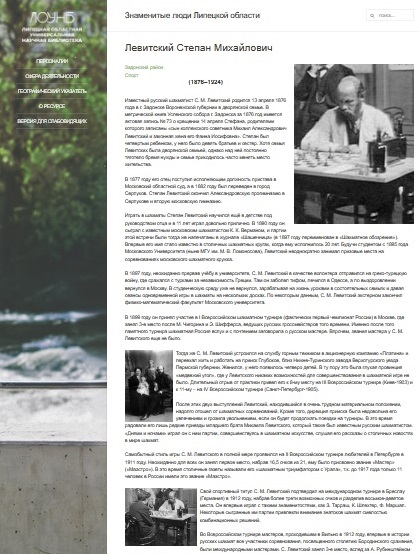
A number of webpages (the above is one example) have a photograph of Levitzky in play against Marshall, with or without a claim that it was taken during the ‘Gold Coins’ Game. What is known about the provenance of the picture?
(12152)
See too Frank James Marshall.
To the Chess Notes main page.
To the Archives for other feature articles.
Copyright: Edward Winter. All rights reserved.